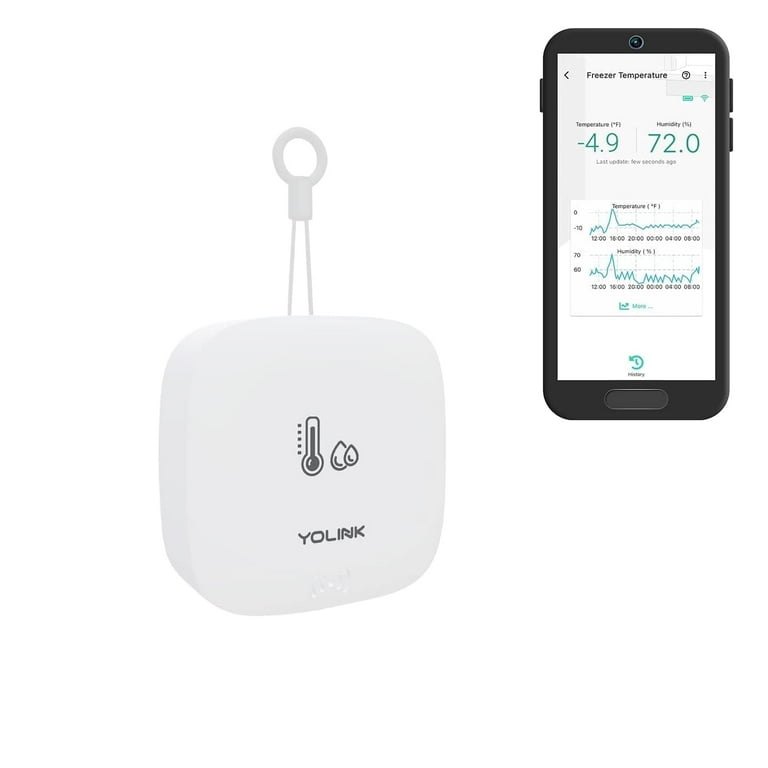Are you tired of your hygrometer suddenly stopping and leaving you guessing about your home’s humidity? Knowing how long your hygrometer battery lasts can save you from unexpected surprises and keep your environment comfortable and safe.
You’ll discover simple tips to extend your battery life and understand when it’s time to replace it. Keep reading to make sure your hygrometer always works when you need it most.
How Hygrometer Batteries Work
Hygrometers use batteries to power their sensors and display screens. These batteries provide the energy needed to measure humidity levels accurately. Without a battery, a digital hygrometer cannot function. The battery sends electrical energy to the device’s circuits. This energy powers the sensor that detects moisture in the air. It also lights up the screen where you see the readings.
Battery life depends on the type of battery and how the hygrometer uses power. Some batteries last longer because they store more energy. Others drain faster due to device features or environmental conditions. Understanding how these batteries work helps in choosing the right one and maintaining your hygrometer well.
Types Of Batteries Used
Most hygrometers use small batteries like button cells or AA batteries. Button cells are compact and fit into tiny devices. AA batteries are larger and offer more power. Rechargeable batteries can also be found in some models. These allow you to recharge instead of replacing them. The choice of battery depends on the hygrometer’s size and power needs.
Battery Drain Factors
Several factors cause a battery to drain faster in a hygrometer. Frequent use of the display screen uses more power. High humidity or extreme temperatures can affect battery life too. Some models have wireless features that consume extra energy. Poor battery quality also leads to quick drainage. Turning off the device when not in use can save battery life.
Common Battery Life Span
The battery life of a hygrometer varies widely based on several factors. Understanding the common lifespan helps users know when to replace batteries. It also aids in choosing the right device for long-term use.
Average Duration By Battery Type
Different batteries last for different time periods in hygrometers. Alkaline batteries typically last 6 to 12 months. Lithium batteries can last longer, often up to 2 years. Rechargeable batteries usually need recharging every 3 to 6 months. The type of battery affects how long the device runs without interruption.
Impact Of Device Usage
How often you check the hygrometer affects battery life. Frequent use drains the battery faster. Devices with backlights or wireless features use more power. Continuous monitoring reduces battery duration. Turning off extra features can extend battery life significantly.
Tips To Extend Battery Life
Extending your hygrometer’s battery life saves money and hassle. Small steps make a big difference. Follow these tips to keep your device working longer and avoid frequent battery changes.
Optimal Storage Conditions
Store your hygrometer in a cool, dry place. Avoid areas with extreme heat or moisture. High temperatures drain batteries faster. Humidity can damage internal parts. Keep the device away from direct sunlight. Proper storage preserves battery life and device health.
Power-saving Settings
Use power-saving modes if your hygrometer has them. Lower the screen brightness or turn off the display when not needed. Reduce measurement frequency to save energy. Switch off wireless features like Bluetooth if unused. These settings help batteries last much longer.
Regular Maintenance
Clean your hygrometer regularly to prevent dust buildup. Dust can cause extra power use. Check battery contacts for corrosion and clean gently. Replace old batteries before they leak or lose power. Maintenance keeps your device running smoothly and extends battery life.

Credit: us.govee.com
Signs Of Battery Wear
Knowing the signs of battery wear helps keep your hygrometer working well. Batteries lose power over time. This causes problems with your device. Spotting early signs can save you from wrong readings and device failure.
Inaccurate Readings
Low battery power often leads to wrong humidity and temperature readings. The device might show numbers that do not match the real air condition. These errors can affect your plans or actions based on the data.
Check if the readings jump or change too fast. This can mean the battery needs replacement. Accurate data is key for using a hygrometer properly.
Device Power Issues
A weak battery can cause the device to turn off suddenly. Sometimes, the hygrometer may fail to turn on at all. This shows the battery is too low to run the device.
Battery wear may also cause the screen to dim or freeze. These power issues reduce the device’s reliability. Changing the battery helps keep your hygrometer ready to use.
Choosing The Right Replacement Battery
Choosing the right replacement battery for your hygrometer is important. It ensures your device works well and lasts longer. A good battery keeps your hygrometer accurate and reliable. Picking the wrong battery can cause issues and may damage the device.
Battery Specifications
Check the battery type your hygrometer needs. Look for size, voltage, and capacity details. Most hygrometers use button cell or AAA batteries. Using the exact specifications helps maintain device performance. Avoid batteries with different voltages or sizes. Read the user manual or the old battery label for correct info.
Quality Vs. Cost
Cheap batteries may save money at first. They often have shorter life and lower quality. High-quality batteries last longer and work better. They reduce the chance of leakage or damage. Investing in good batteries protects your hygrometer. Balance price and quality to get the best value.

Credit: www.amazon.com
Innovations In Battery Technology
Battery technology has improved a lot in recent years. These changes help hygrometers work longer without needing new batteries. Users now enjoy more convenience and less worry about power running out.
New battery designs focus on lasting longer and being easier to recharge. These innovations make hygrometers more reliable for daily use. The choice of battery type affects how long the device can measure humidity accurately.
Rechargeable Options
Rechargeable batteries are becoming common in modern hygrometers. They can be used many times, reducing waste and cost. Users simply plug in the device to recharge it. This means no need to buy new batteries often.
These batteries hold a charge for a long time. They work well for devices used every day. Rechargeable options are good for saving money and the environment.
Long-lasting Battery Models
Some hygrometers use special batteries designed to last very long. These models can run for months or even years. They are perfect for places hard to reach or check often.
Long-lasting batteries reduce the need for frequent changes. This saves time and effort for users. Many manufacturers now focus on these battery types to improve device life.

Credit: www.walmart.com
Frequently Asked Questions
How Long Does A Hygrometer Battery Last?
A hygrometer battery typically lasts 1 to 2 years. Battery life depends on device usage and type. Some models have low power consumption, extending battery life. Regular battery checks ensure accurate humidity readings and device functionality.
What Factors Affect Hygrometer Battery Life?
Battery life is affected by usage frequency, sensor type, and display brightness. Continuous data logging or wireless features drain batteries faster. Environmental conditions like temperature extremes can also impact battery performance. Choosing energy-efficient models improves battery longevity.
How To Know When Hygrometer Battery Needs Replacement?
Most hygrometers display a low battery indicator or warning. If readings become erratic or the device powers off unexpectedly, replace the battery. Regular maintenance and timely battery changes ensure reliable humidity measurements.
Can Rechargeable Batteries Be Used In Hygrometers?
Yes, many hygrometers support rechargeable batteries. Rechargeables reduce waste and save money long-term. Ensure compatibility with the device’s voltage and size requirements before use. Charging frequency depends on battery capacity and device power consumption.
Conclusion
Maintaining your hygrometer’s battery helps it work longer and better. Regular checks prevent sudden power loss and inaccurate readings. Choose quality batteries for steady performance and less replacement hassle. Keep spare batteries handy to avoid downtime in monitoring humidity. Proper battery care means your device stays reliable every day.
Simple steps make a big difference in battery life. Stay aware and your hygrometer will serve you well.

